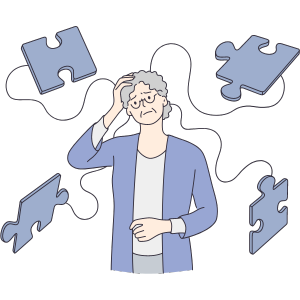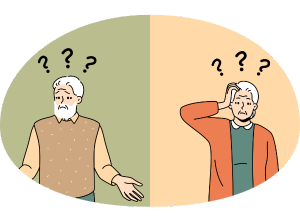As summer comes to an end, I’m excited about the fresh start that fall brings – a chance to hit the reset button and reprioritize our goals for the rest of the year. This month, we’re focusing on Alzheimer’s and Brain health. I’d like to shed light on a topic that’s stirring discussions in the medical community: The Intricate Relationship Between Hormone Replacement Therapy (HRT) and Alzheimer’s disease and Dementia. Amidst the mix of confusing research and conflicting news, let’s break down what we’re certain about, what’s still a mystery, and how to approach this complex subject with an informed perspective.
What is Alzheimer’s Disease and Dementia?
- Dementia serves as an umbrella term for a number of conditions that result in cognitive decline or memory impairment (6).
- Dementia affects cognitive functions such as memory, thinking, reasoning, language, and behaviour (6).
- Types of Dementia include Alzheimer’s disease, vascular dementia, Lewy body dementia, and frontotemporal dementia (6).
- Each type of Dementia has distinct characteristics, causes, and progression patterns (6).
- Alzheimer’s disease (AD) is the most well-known form of dementia and accounts for a large majority of dementia cases. It is characterized by the buildup of abnormal tau protein deposits in the brain, leading to the loss of brain cells and the progressive decline of cognitive functions (6).
What We Know for Certain:
- Alzheimer’s and Aging: Alzheimer’s disease and dementia are closely tied to the natural aging process, with the incidence of Alzheimer’s disease and dementia significantly increasing with age (2,6).
- Disparity between the sexes: Notably, women exhibit a higher vulnerability to Alzheimer’s, constituting about two-thirds of all Alzheimer’s cases (2).
- APOE4 Gene Variant: The APOE4 gene variant has emerged as a factor associated with early-onset Alzheimer’s (8).
- Limited Treatment Options: Regrettably, managing or reversing Alzheimer’s post-diagnosis remains a challenge. Although medications alleviate symptoms, they do not alter the disease’s course.
- Testosterone’s Role: Research indicates that lower baseline testosterone levels could elevate the risk of Alzheimer’s and dementia. Conversely, higher baseline testosterone levels may serve as a protective factor against these cognitive disorders (1).
- Connection with Diabetes: Notably, there exists a link between diabetes and dementia risk. The latest North American Menopause Society (NAMS) guidelines (2022) suggest that hormone therapy may mitigate the incidence of new-onset type 2 diabetes and aid in glycemic control for women with pre-existing diabetes. Additionally, testosterone administration has demonstrated potential benefits for glycemic control and reducing the risk of new-onset type 2 diabetes (9).
- Androgen Deprivation’s Impact: Observational studies indicate a potentially higher risk of dementia among men undergoing androgen deprivation therapy for prostate cancer (7).
What Remains to Be Clarified
- Disparity Between the Sexes: The reasons underlying the difference between men and women in Alzheimer’s risk remain multifaceted and not entirely understood. Women have a longer life expectancy which was hypothesized to play a role, however, even when controlling for this factor, women still have an increased risk for the development of Alzheimer’s disease. The abrupt decline in hormones with menopause, which is not seen in men, may play a part, which suggests a role of HRT in the process, but further research is required (2).
- HRT’s Influence on Cognitive Decline: Two hypotheses concerning the impact of HRT on cognitive decline exist:
- “Critical Window” theory suggests potential benefits of estrogen if administered early in menopause, while treatment outside the 10-year window of menopause could cause increased risk of Alzheimer’s.
- “Healthy-cell bias” theory proposes benefits in the presence of healthy brain tissue.
However, neither theory has been substantiated through randomized clinical trials (3,9).
Considerations for the Future
- Demand for Rigorous Studies: The pursuit of high-quality studies is imperative to decipher the relationship between HRT and Alzheimer’s risk. Given the limited management options, prevention is paramount.
- Formulations Matter: Diverse HRT formulations exist, each with distinct characteristics. It’s important to recognize that findings from one formulation cannot be universally applied to others. Available estrogens include Conjugated equine estrogen (CEE), synthetic conjugated estrogen (CE), micronized 17-Beta Estradiol, Ethniyl estradiol. Available progestogens: Synthetic progestins- Medroxyprogesterone acetate (MPA), norethindrone acetate (NETA), levonorgesterol, and Micronized Progesterone. Estrogen, Progesterone, Progestin (9)
- Synthetic vs. Bioidentical Formulations: Concerns over dementia risk have often centered around synthetic estrogen and progestin formulations, as opposed to bioidenticals.
- Interpreting Research: It’s crucial to discern the quality and nature of studies. Retrospective review of health databases are low quality evidence and observational studies are hypothesis generating but don’t prove causation. Remember correlation doesn’t equal causation!
- Absolute vs. Relative Risk: Understanding the distinction between absolute and relative risk is key to grasping research findings in their proper context. (To ensure understanding, this post on my Instagram page helps explain the concept.)
- Revisiting the WHI Study: The infamous WHI study’s claimed CEE +MPA “doubled” the risk of dementia. (Of note: this was only women who had cognitive decline at the time of the study) (2). Eighteen-year follow up data has shown that AD related death was decreased in the group randomized to HRT (4,11).
To Recap:
The intricacies of how HRT interacts with Alzheimer’s risk are still unfolding. The interplay between hormones, diabetes, and heart health adds another layer to this intricate puzzle. As with any medical decision, a balanced assessment of risks and benefits is paramount. The NAMS guidelines (2022) suggest that the risk increase associated with Estrogen or Estrogen/Progestogen therapy (regardless of formulation) is rare (<10/10,000). These guidelines also highlight decreased all-cause mortality, fractures, diabetes, and breast cancer among women aged 60 and under receiving HRT (9). In men, studies of Testosterone Replacement Therapy have shown improved cognition and memory, as well as a reduction in risk of Alzheimer’s disease (1,5,10).
In my perspective, carefully optimizing hormones under the guidance of a knowledgeable healthcare professional can offer numerous benefits. While prevention hasn’t been explicitly endorsed, I believe that adopting a holistic approach that encompasses exercise, sleep, a balanced diet, and hormonal therapy when indicated, can contribute to lowering individual risk. I hope future studies will investigate specific formulations, ideally bioidenticals, and their relationship with cognitive decline, dementia and Alzheimer’s disease. Although causation remains complex, in my opinion, the disparity between men and women in the development of Alzheimer’s development hints at a compelling hormonal link. I hope future research explores this link and how we could harness the power of hormones in the prevention or management of cognitive decline.
If you’re curious about how hormone optimization could impact your health and wellness, I’d love for you to reach out! Check out our website and my Instagram page for more information!
And book a complimentary 15-minute consultation with me – I’d love to explore this path with you 😊
Shelby Sheppard
Nurse Practitioner
Follow us @hormone_optimization


